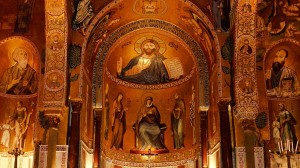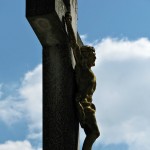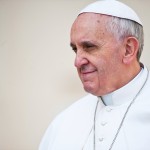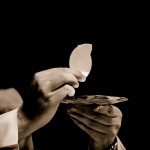(This article was written for “The Anglican Digest,” Volume 57, No. 3, Fall 2015. It can be read online here. The theme for this edition of the Digest was the “Communion of the Saints.” Many thanks to the (Rt.) Rev. Anthony Clavier for the invitation to submit my writing for consideration.)
In the fullness of time, put all things in subjection under your Christ, and bring us to that heavenly country where, with all your saints, we may enter the everlasting heritage of your sons and daughters; through Jesus Christ our Lord, the firstborn of all creation, the head of the Church, and the author of our salvation.
1979 Book of Common Prayer, Eucharistic Prayer B, Rite II
The celebration of the Eucharist is the sacrament par excellence of the church and the primary locus of her communion with the triune God. Any theological conversation about the often-ambiguous “communion of the saints” must begin and end with a robust understanding of koinonia in, with, and through the Trinity. The powerful imagery of heavenly worship portrayed in Revelation 4-5 comes to earthly fruition in our own sacrifice of praise and thanksgiving. It is my contention that the church militant is most connected to the church triumphant through her doxological and eucharistic worship.
Koinonia and the Godhead
In line with the writings of John Zizioulas, our first step toward true communion (koinonia) must begin with the self-contained, mutual, and self-giving fellowship of the Trinity. Our koinonia with the Father, the Son, and the Holy Spirit is based on the invitation to participate in the love that overflows from and has eternally existed within the Three-in-One. To be truly human is to be in communion with God for there is no existence outside of and apart from Him.
Throughout Scripture, God made it possible for his people to commune with Him: he “tabernacled” with Israel as she wandered through the desert; God “took up residence” in the Temple in Jerusalem; He spoke through prophets, judges and kings and delivered his people time and time again. He was most fully revealed through the incarnation, life, teachings, ministry, healings, crucifixion, resurrection, and exaltation of Jesus of Nazareth. Through Christ we have been adopted into the covenant family of God and made co-heirs of his kingdom.
The sacramental life of the church draws us into deeper relationship with the Trinity. In the waters of baptism we are initiated as covenant family members and united with Christ’s death and resurrection in the name of the Father, the Son, and the Holy Spirit. Through the ministry of the Holy Spirit, we have communion with God when we celebrate the Eucharist as both the reaffirmation of our baptismal vows and the realization of our priestly (of all believers) calling to be the church.
Communion of the Saints
The hymn “The Church’s One Foundation” states profoundly, “Yet she on earth hath union with God the Three in One; And mystic sweet communion with those whose rest is won.” Communion with the saints only comes in and through the union the church experiences with the Trinity. As both the “sacrament of the kingdom” and the “Sacrament of sacraments,”[1] the Church most fully experiences this union in her regular celebration of the Eucharist.
Whether you believe in life after death or the preferred “life after life after death”[2] there is the hope and promise of union with those saints who have gone before and those who will come after. The Eucharist is not a form of religious magic but is rather the mystical, sweet union of God and Church transcending time and space through the power of the Holy Spirit. As we “lift up our hearts” in the Sursum Corda and sing the Sanctus we are, “Joining our voices with angels and archangels and all the company of heaven who forever sing…” Our oblation is local to our historical context but it is most importantly part of a universal, ongoing offering of praise and thanksgiving.
Scripture offers a few glimpses at the communion of the saints. Both the letter to the Hebrews and John’s vision in Revelation provide the biblical framework for our participation in a covenant family much larger than the visible church. Additionally, Hebrews and Revelation should be seen as liturgical books—or at the very least letters containing liturgical visions and imagery. The reference to the “great cloud of witnesses” in Hebrews 12 and John’s vision in Revelation 5:13), “Then I heard every creature in heaven and on earth and under the earth and in the sea, and all that is in them, singing,” are liturgical in nature. It is not that the communion of saints is impossible apart from liturgical worship, but rather that our worship of the Godhead is what makes any understanding of communion both possible and tangible.
Christ the Qualifier
Eucharistic worship is to the Father, through the Son, and by the Holy Spirit. In order to avoid talking about a vague religious order we must first add a qualifier to the phrase “the communion of the saints.” Who or what is the qualifier? Jesus the Christ. We conclude our Eucharistic Prayer with the words, “By him, and with him, and in him, in the unity of the Holy Spirit all honor and glory is yours, Almighty Father, now and for ever. AMEN.” The foundation of the church’s communion—the very underpinnings of the combination of church militant and triumphant—is the second person of the Trinity whose sacrifice we remember (anamnesis) and whose flesh and blood we do eat and drink.
It is through the words and actions of our heartfelt praise and gratitude that we are connected to believers across all generations in a real and tangible sense. We have the hope that when the kingdom is fulfilled we will sit around the table in that heavenly country with brothers and sisters whom we have never met. Until that day, we are called to bring our oblation before the Lord with the confidence that we are surrounded by a great cloud of witnesses who are proclaiming, “To the one seated on the throne and to the Lamb be blessing and honor and glory and might forever and ever!” Communion begins and ends with the throne of God – may we find our fellows saints as we approach with humble confidence.
[1] Both quotations are references from Eucharist: Sacrament of the Kingdom by Protopresbyter Alexander Schmemann.
[2] N. T. Wright, Surprised By Hope

















